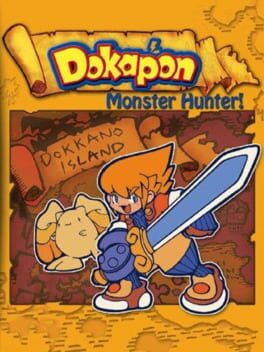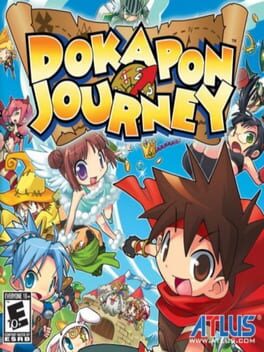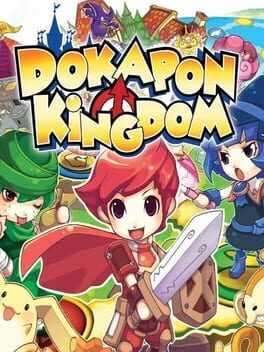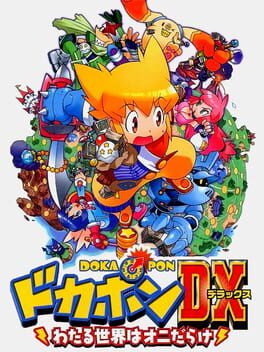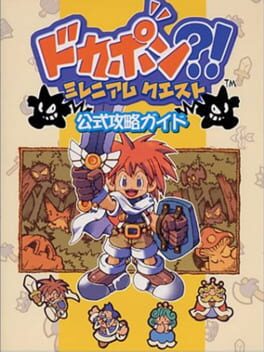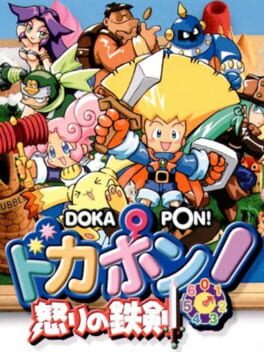

Dokapon is a deep, long playing, thoroughly absorbing RPG that takes place on Dokkano Island in the town of Poponga, a mystical place full of mystical creatures. Your goal is to become a a licensed adventurer - to do this you must pass an adventurer's exam by completing a number of assigned missions, and along the way defeat all kinds of monsters in battle. Once beaten, you can collect the monster and make it your "monster partner", and use it in future battles to defeat opponents.
Also in series
Reviews View More
Dokpaon Monster Hunter is a mystery dungeon style game that feels like a lazy copy and paste of their board game mechanics. The result is a game that feels slow, tedious, lazy, and poorly thought out.
The game is terribly translated, and not in the way that gives it character like in later entries, it's just barely understandable. The story is childish nonsense anyway, NPC's spout generic lines that repeat the same thing over and over, and then you go to the first dungeon.
There's no tutorial or explanation on how to play, the items you get have no use because enemies die in one hit and you take 1 damage if you do get hit, the combat transitions are very slow and enemies are very common so that gets old fast, and the combat music is a very annoying 3 second loop.
All the tactical variety is in small numerical buffs to attack, defence, or speed, as are the skills you start unlocking, and the bonuses from the weapons you discover. Not that you have any use for them. Enemy sprites in the dungeon also don't look anything like what you end up fighting, and the level designs are incredibly simplistic with no real features.
When I finally got to the boss it one shot me despite having found some 'prevent knockout' items. Maybe if I'd had a reason to figure out what the rock paper scissors mechanics do or if I'd gotten lucky and found better gear I might have survived? All I know for sure is I lost everything found so far and had to start the dungeon over from scratch. I didn't feel like losing another hour to playing more of this.
The copy pasted combat mechanics from the other Dokapon games feel ironically out of place in this rpg game, combat is tedious, poorly implemented, and unintuitive. Menus don't work how you would expect, the skills are numeric and boring, the items and equipment are lacklustre, the maps are dull, the enemies are generic, and the writing is terrible. Maybe mystery dungeons aren't my thing but the core loop was just very off putting. Low marks all around.
The game is terribly translated, and not in the way that gives it character like in later entries, it's just barely understandable. The story is childish nonsense anyway, NPC's spout generic lines that repeat the same thing over and over, and then you go to the first dungeon.
There's no tutorial or explanation on how to play, the items you get have no use because enemies die in one hit and you take 1 damage if you do get hit, the combat transitions are very slow and enemies are very common so that gets old fast, and the combat music is a very annoying 3 second loop.
All the tactical variety is in small numerical buffs to attack, defence, or speed, as are the skills you start unlocking, and the bonuses from the weapons you discover. Not that you have any use for them. Enemy sprites in the dungeon also don't look anything like what you end up fighting, and the level designs are incredibly simplistic with no real features.
When I finally got to the boss it one shot me despite having found some 'prevent knockout' items. Maybe if I'd had a reason to figure out what the rock paper scissors mechanics do or if I'd gotten lucky and found better gear I might have survived? All I know for sure is I lost everything found so far and had to start the dungeon over from scratch. I didn't feel like losing another hour to playing more of this.
The copy pasted combat mechanics from the other Dokapon games feel ironically out of place in this rpg game, combat is tedious, poorly implemented, and unintuitive. Menus don't work how you would expect, the skills are numeric and boring, the items and equipment are lacklustre, the maps are dull, the enemies are generic, and the writing is terrible. Maybe mystery dungeons aren't my thing but the core loop was just very off putting. Low marks all around.
The history of Asmik Ace's game development and publishing ventures is a curious one, their back catalogue consisting of games across numerous platforms and genres, but very few enjoying any international attention. There is scant English-language information on the actual behind-the-scenes at Asmik, but it is clear from their output that they were attempting a lot of different things to see what would stick. Just three years prior to Dokapon: Monster Hunter! was the release of LSD: Dream Emulator for the Playstation in 1998, a pastiche of Japanese cultural weirdness that would become the quintessential gateway for many Westerners into experimental video games.
Their in-house development team's main focus has been the Dokapon series, which were structured like a board game and utilized a literal rock-paper-scissors based combat system. Starting with Kessen! Dokapon Oukoku IV: Densetsu no Yuusha Tachi, the mainline games were released only in Japan until Atlus and BigBen Entertainment brought 2008's Dokapon Kingdom to international audiences. Yet the totality of the Dokapon series spans 9 main series games, 3 side games, and 6 mobile games. So Dokapon Kingdom wasn't actually the West's first introduction to the series- this honor actually belongs to the Game Boy Advance-only spinoff title Dokapon: Monster Hunter! released in 2001.
Monster Hunter! does not have the board game-style mechanics of its predecessors, and instead replaces it with a blatant copy of the Mystery Dungeon roguelike games. I would call it inexplicable, but Chunsoft was doing pretty well for itself at the time: 1999's Torneko: The Last Hope, 2000's Shiren the Wanderer 2: Oni Invasion! Shiren Castle! and 2001's Shiren the Wanderer GB2: Magic Castle of the Desert all enjoyed critical acclaim in Japan. So it is understandable that Asmik perhaps wished to cash in on the success of the formula by integrating into Dokapon. What really confuses me was their decision to bring it to North America through publisher AIA. Prior to Dokapon: Monster Hunter!, the West's only exposure to the formula was the Final Fantasy tie-in Chocobo's Dungeon 2 in 1998. Chocobo's Dungeon ended up being a critical failure in North America, so it is rather amusing that Monster Hunter! reached American audiences at all.
Unfortunately, this game does the legacy of Mystery Dungeon absolutely no favors in its thorough mediocrity. This can be mainly attributed to the Dokapon Rock-Paper-Scissors combat system. Imagine playing Shiren or Pokemon Mystery Dungeon but every combat interaction came down to a series of dice rolls rather than any strategy. That is what Monster Hunter! offers as combat. You assign a different combat effect to each "slot" on your weapon and shield corresponding to rock, paper and scissors.There are also "neutral" attack and defense options that operate according to different rules. The myriad of different interactions gives an illusion of depth, but what you do ultimately doesn't matter. You are still at the mercy of whatever the RNG decides the enemy will roll.
I haven't played Dokapon Kingdom, but I imagine the combat works in that setting specifically because of the board-game setting, wherein the combat isn't the central element of the overall experience. In a Mystery Dungeon styled roguelike, though, the combat is what is going to make or break a run. It adds another element of near-uncontrollable randomness to the notoriously fickle world of procedural generation, making this my least favorite implementation of Mystery Dungeon gameplay since Mystery Chronicles: One Way Hero.
Another thing I can't seem to get past in this game is the localization work done by AIA. It is some of the worst translation I have seen in an officially-licensed title on the Game Boy Advance. It reminds me of those early-2000s machine translations done by fans on romhacking.net, except somebody was actually paid for it. At best, it results in some amusing lines for you to screenshot ("I get so excited when you come.") At worst, it actively hinders you from understanding the game and what is going on. AIA seems to have gone inactive since 2003, but to me that is no big loss, as this feels like it was simply a rushed tax writeoff. Absolutely no care was put into the localization.
I dropped this game as it is just a completely unappealing mess that fails to emulate much better titles. Most of my playtime was spent getting stunlocked by a random enemy due to losing rock paper scissors 5 times in a row. Once I got to the boss; I lost one dice roll and was insta-killed, lost all my items in Mystery Dungeon fashion, and was sent back to the start. I highly recommend staying away from this and just sticking to either the mainline Dokapon titles or actual Chunsoft Mystery Dungeon titles.
Their in-house development team's main focus has been the Dokapon series, which were structured like a board game and utilized a literal rock-paper-scissors based combat system. Starting with Kessen! Dokapon Oukoku IV: Densetsu no Yuusha Tachi, the mainline games were released only in Japan until Atlus and BigBen Entertainment brought 2008's Dokapon Kingdom to international audiences. Yet the totality of the Dokapon series spans 9 main series games, 3 side games, and 6 mobile games. So Dokapon Kingdom wasn't actually the West's first introduction to the series- this honor actually belongs to the Game Boy Advance-only spinoff title Dokapon: Monster Hunter! released in 2001.
Monster Hunter! does not have the board game-style mechanics of its predecessors, and instead replaces it with a blatant copy of the Mystery Dungeon roguelike games. I would call it inexplicable, but Chunsoft was doing pretty well for itself at the time: 1999's Torneko: The Last Hope, 2000's Shiren the Wanderer 2: Oni Invasion! Shiren Castle! and 2001's Shiren the Wanderer GB2: Magic Castle of the Desert all enjoyed critical acclaim in Japan. So it is understandable that Asmik perhaps wished to cash in on the success of the formula by integrating into Dokapon. What really confuses me was their decision to bring it to North America through publisher AIA. Prior to Dokapon: Monster Hunter!, the West's only exposure to the formula was the Final Fantasy tie-in Chocobo's Dungeon 2 in 1998. Chocobo's Dungeon ended up being a critical failure in North America, so it is rather amusing that Monster Hunter! reached American audiences at all.
Unfortunately, this game does the legacy of Mystery Dungeon absolutely no favors in its thorough mediocrity. This can be mainly attributed to the Dokapon Rock-Paper-Scissors combat system. Imagine playing Shiren or Pokemon Mystery Dungeon but every combat interaction came down to a series of dice rolls rather than any strategy. That is what Monster Hunter! offers as combat. You assign a different combat effect to each "slot" on your weapon and shield corresponding to rock, paper and scissors.There are also "neutral" attack and defense options that operate according to different rules. The myriad of different interactions gives an illusion of depth, but what you do ultimately doesn't matter. You are still at the mercy of whatever the RNG decides the enemy will roll.
I haven't played Dokapon Kingdom, but I imagine the combat works in that setting specifically because of the board-game setting, wherein the combat isn't the central element of the overall experience. In a Mystery Dungeon styled roguelike, though, the combat is what is going to make or break a run. It adds another element of near-uncontrollable randomness to the notoriously fickle world of procedural generation, making this my least favorite implementation of Mystery Dungeon gameplay since Mystery Chronicles: One Way Hero.
Another thing I can't seem to get past in this game is the localization work done by AIA. It is some of the worst translation I have seen in an officially-licensed title on the Game Boy Advance. It reminds me of those early-2000s machine translations done by fans on romhacking.net, except somebody was actually paid for it. At best, it results in some amusing lines for you to screenshot ("I get so excited when you come.") At worst, it actively hinders you from understanding the game and what is going on. AIA seems to have gone inactive since 2003, but to me that is no big loss, as this feels like it was simply a rushed tax writeoff. Absolutely no care was put into the localization.
I dropped this game as it is just a completely unappealing mess that fails to emulate much better titles. Most of my playtime was spent getting stunlocked by a random enemy due to losing rock paper scissors 5 times in a row. Once I got to the boss; I lost one dice roll and was insta-killed, lost all my items in Mystery Dungeon fashion, and was sent back to the start. I highly recommend staying away from this and just sticking to either the mainline Dokapon titles or actual Chunsoft Mystery Dungeon titles.
